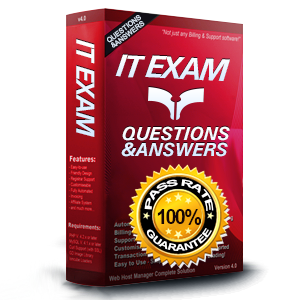
JN0-343 Exam Questions & Answers
Exam Code: JN0-343
Exam Name: Juniper Networks Certified Internet Specialist (JNCIS-ENT)
Updated: Apr 19, 2024
Q&As: 563
At Passcerty.com, we pride ourselves on the comprehensive nature of our JN0-343 exam dumps, designed meticulously to encompass all key topics and nuances you might encounter during the real examination. Regular updates are a cornerstone of our service, ensuring that our dedicated users always have their hands on the most recent and relevant Q&A dumps. Behind every meticulously curated question and answer lies the hard work of our seasoned team of experts, who bring years of experience and knowledge into crafting these premium materials. And while we are invested in offering top-notch content, we also believe in empowering our community. As a token of our commitment to your success, we're delighted to offer a substantial portion of our resources for free practice. We invite you to make the most of the following content, and wish you every success in your endeavors.

Download Free Juniper JN0-343 Demo
Experience Passcerty.com exam material in PDF version.
Simply submit your e-mail address below to get started with our PDF real exam demo of your Juniper JN0-343 exam.
![]() Instant download
Instant download
![]() Latest update demo according to real exam
Latest update demo according to real exam
* Our demo shows only a few questions from your selected exam for evaluating purposes
Free Juniper JN0-343 Dumps
Practice These Free Questions and Answers to Pass the JNCIS Exam
Which three attributes are considered in the default configuration of per-flow load balancing for routed IPv4 traffic? (Choose three.)
A. incoming interface
B. source MAC address
C. protocol
D. source IP address
E. destination port
You must configure an OSPF area that must not contain any ASBRs and that must not receive any Extern (Type 5) LSAs. This area should be aware of the entire OSPF network, but it should not be aware of routes external to OSPF. Which area type meets these requirements?
A. not-so-stubby area
B. totally stubby area
C. stub area
D. backbone area
-- Exhibit ?
{master:0}
user@switch> show vlans
Name Tag Interfaces
default
ge-0/0/1.0, ge-0/0/2.0, ge-0/0/3.0, ge-0/0/4.0,
ge-0/0/8.0*, ge-0/0/9.0*, ge-0/0/10.0*, ge-0/0/11.0*,
ge-0/0/12.0*, ge-0/0/13.0*
v10 10
ge-0/0/5.0, ge-0/0/6.0*, ge-0/0/7.0*
-- Exhibit -You are trying to pass traffic using VLAN v10; however, traffic is not reaching the device connected to port ge-0/0/5.
Given the information shown in the exhibit, what is the problem?
A. The ge-0/0/5 interface is down.
B. The ge-0/0/5 interface is an access port.
C. The ge-0/0/5 interface has been deactivated.
D. The ge-0/0/5 interface is a trunk port.
Based on the output shown in the exhibit, which statement is correct? user@router> show ospf neighbor AddressInterfaceState IDRri Dead 172.16.248.214xe-0/0/2.02-Way 172.16.248.1412839
A. The router is acting as the BDR.
B. The router is acting as the DR.
C. The router is not able to establish an adjacency.
D. The router is acting as a DROther.
Which two statements are correct about redundant trunk groups on EX Series switches? (Choose two.)
A. If the active link fails, then the secondary link automatically takes over.
B. Layer 2 control traffic is permitted on the secondary link.
C. Redundant trunk groups load balance traffic across two designated uplink interfaces.
D. Redundant trunk groups use spanning tree to provide loop-free redundant uplinks.
Viewing Page 1 of 3 pages. Download PDF or Software version with 563 questions

